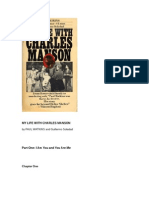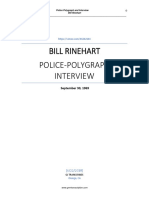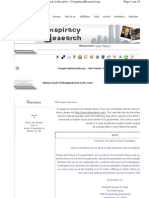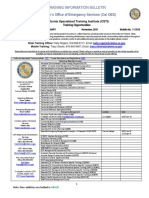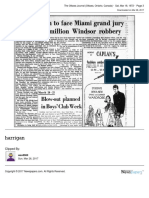Tex Watson's Appeal
Tex Watson's Appeal
Uploaded by
Leanne JuddCopyright:
Available Formats
Tex Watson's Appeal
Tex Watson's Appeal
Uploaded by
Leanne JuddOriginal Description:
Copyright
Available Formats
Share this document
Did you find this document useful?
Is this content inappropriate?
Copyright:
Available Formats
Tex Watson's Appeal
Tex Watson's Appeal
Uploaded by
Leanne JuddCopyright:
Available Formats
In re Boyd Veigel, P.C., Not Reported in F.Supp.
2d (2013)
parties' briefs, the court finds that the bankruptcy court's
order should be affirmed.
2013 WL 1222342
Only the Westlaw citation is currently available.
United States District Court,
E.D. Texas, BACKGROUND
Sherman Division.
On August 9, 1969, Sharon Tate and several other
In re BOYD VEIGEL, P.C., Debtor. individuals were murdered in California in a crime
Charles Watson, Appellant, commonly referred to as the “Tate–La Bianca Murders.”
v. Charles D. Watson (hereinafter “Watson”) was arrested
Linda Payne, Appellee. in McKinney, Texas on November 30, 1969 for his role
in the murders. Watson retained Mr. Bill Boyd of Boyd,
No. 4:12–cv–368. Veigel & Gay to represent him in connection with the
| murder charges. On December 3, 1969, Watson executed
March 24, 2013. a document styled “Contract of Employment of Boyd,
Veigel & Gay.” The pertinent portions of the contract are
Attorneys and Law Firms as follows:
William Kelly Puls, Puls & Liebrecht, PC, Fort Worth,
NOW THEREFORE KNOW ALL MEN BY THESE
TX, for Appellant.
PRESENTS that:
Bill F. Payne, The Moore Law Firm, Paris, TX, Mark A.
1. I hereby turn the defense of my case or cases
Weisbart, The Law Offices of Mark A. Weisbart, Dallas,
over to BOYD, VEIGEL & GAY and employ them
TX, for Appellee.
as principal counsel and leave the matter of the
Donald Lee Johnston, Law Office of Donald Johnston, association of any other attorneys to their sound
Sherman, TX, for Debtor. discretion.
2. I hereby authorize BOYD, VEIGEL & GAY to
represent me in any and all matters pertaining to me,
MEMORANDUM OPINION AND ORDER my case, my defense, my rights and my property.
AFFIRMING APPEAL FROM THE UNITED
STATES BANKRUPTCY COURT FOR THE 3. I hereby agree to pay the law firm of BOYD,
EASTERN DISTRICT OF TEXAS SHERMAN VEIGEL & GAY reasonable attorney's fees and
DIVISION (CASE NUMBER 09–43943–R) reimbursement for all actual expense incurred in my
case or cases.
RICHARD A. SCHELL, District Judge.
7. I hereby transfer and assign one half of all my
*1 The Appellant, Charles D. Watson, appeals the property of every kind and character including any
bankruptcy court's May 31, 2012 “Order Granting money, compensation or other thing of value which
Motion for Court to Direct Trustee to Turnover All I might receive as direct or indirect payment or
Recordings Between Debtor and Charles D. Watson to royalty from any newspaper, magazine, television
the Los Angeles Police Department and All Legal Files or radio station or other individual or companies
Between Debtor and Charles D. Watson to Charles D. for any statements, stories, interviews, pictures, tapes
Watson c/o of His Nephew Brian Patton.” In the order, or recordings to BOYD, VEIGEL & GAY, 218 E.
the bankruptcy court directed the Trustee, Linda Payne, Louisiana Street, McKinney, Texas.
to turn over all tape recordings between the Debtor and
Watson to the Los Angeles Police Department and to 8. I further transfer and assign the remaining one half or
turn over all other legal materials between the Debtor and so much of same as may be necessary of said property
Watson to Watson in care of Watson's attorney, Kendrick to BOYD, VEIGEL & GAY to reimburse them for
Jan. Having reviewed the bankruptcy court's order and the any expenses such as travel, lodging, meals, etc. that
© 2017 Thomson Reuters. No claim to original U.S. Government Works. 1
In re Boyd Veigel, P.C., Not Reported in F.Supp.2d (2013)
they may incur as a result of counseling and advising bankruptcy court conducted a hearing on Payne's motion
with me or representing me in Court. on May 29, 2012. At the hearing, Watson's counsel
objected to Payne turning over the cassette tapes to
While representing Watson, Mr. Boyd recorded the LAPD, asserting the cassette tapes were subject to
discussions between Watson and himself. The recorded the attorney/client privilege. Watson's counsel further
conversations are contained on eight cassette tapes. Mr. contended that the waiver was limited to Chaplain
Boyd subsequently sold a copy of the cassette tapes to Hoekstra and/or any authors or publishers selected by
Chaplain Raymond G. Hoekstra with the International Chaplain Hoekstra in cooperation with the book on
Prison Ministries for $49,000 for partial payment of Watson's life.
Watson's legal fees. The cassette tapes formed, in part, the
basis of Chaplain Hoekstra's book, “Will You Die for Me? At the conclusion of the hearing, the bankruptcy court
The Man Who Killed for Charles Manson Tells His Own held as follows:
Story: Tex Watson as told to Chaplain Ray.”
... The burden of proof to establish the existence of the
*2 Presumably prior to Mr. Boyd releasing the cassette attorney/client privilege rests on the party asserting the
tapes to Chaplain Hoekstra, Watson executed a “Waiver privilege. See, e.g., In re Santa Fe International Corp.,
of Attorney–Client Privilege.” The waiver, which was 272 F.3d 705, 5th Circuit, 2001; U.S. v. Kelly, 569 F.2d
signed by Watson in September 1976, provides as follows: 928, 5th Circuit, 1978.
I, CHARLES DENTON The privilege claimant must establish both existence of
WATSON, request that my the privilege and the absence of a waiver. See, e.g.,
attorney, Bill Boyd, cooperate James v. Harris County Sheriff's Department at 237
fully with Chaplain Raymond G. F.R.D. 606, Southern District of Texas, 2006.
Hoekstra, and/or any authors or
The Texas Rules of Evidence provide that the attorney/
publishers selected by him in
client privilege can be waived by the client. Rule 511 of
cooperation with the book on my
the Texas Rules of Evidence provide the person upon
life. I understand the attorney-client
whom these rules confer privilege against disclosure
privilege and agree to waive the same
waives the privilege if the person or predecessor of
as to the release by my attorney, Bill
the person while holder of the privilege voluntarily
Boyd, of any information obtained
discloses or consents to disclosure of any significant
by him from me or any other source
part of the privilege matter, unless such disclosure itself
during his representation of me.
is privileged.
Mr. Boyd passed away on August 29, 2009. On December The Court having reviewed the motion and the
14, 2009, the law firm of Boyd Veigel, P.C. filed a attachments thereto, including the written waiver of
voluntary Chapter 7 bankruptcy petition in the United attorney/client privilege signed by Tex Watson in
States Bankruptcy Court for the Eastern District of Texas. September 1976 and having considered the testimony of
Linda Payne (hereinafter “Payne”) was appointed as the the Chapter 7 Trustee, finds that Tex Watson has failed
trustee for the firm's bankruptcy estate. As the trustee for to establish that the attorney/client privilege applies.
the firm, Payne came into possession of the cassette tapes The Court finds that Tex Watson as a matter of law
as well as two boxes of paper files concerning Watson. 1 expressly waived his attorney/client privilege as to the
tapes in question. Therefore, the Court will grant the
Upon learning that Payne was in possession of the cassette motion.
tapes, the Los Angeles Police Department (hereinafter
*3 TR., May 29, 2012 Hearing, pp. 22–23. On May 31,
“LAPD”) sent a letter to Payne on March 19, 2012
2012, the bankruptcy court ordered the Trustee to turn
requesting the original cassette tapes. Thereafter, Payne
over the cassette tapes to the LAPD. On June 12, 2012,
filed a motion with the bankruptcy court on April 27,
Watson appealed the bankruptcy court's May 31, 2012
2012. Payne sought an order from the court directing
order.
her to turn over the cassette tapes to the LAPD. The
© 2017 Thomson Reuters. No claim to original U.S. Government Works. 2
In re Boyd Veigel, P.C., Not Reported in F.Supp.2d (2013)
Prior to filing the notice of appeal, Watson filed a pro After filing his notice of appeal, Watson designated the
se motion with the bankruptcy court requesting the issues to be decided on appeal. Those issues are as follows:
bankruptcy court to permit the LAPD to listen to the
cassette tapes in the presence of the Trustee or another 1. Whether a Chapter 7 trustee is permitted to waive
person appointed by the court. Watson further requested the United States Constitution's Fifth Amendment
that the court order the LAPD to return the cassette tapes privileges on behalf of a law firm debtor's client;
to Watson's attorney after the LAPD finished listening to
2. Whether a non-lawyer Chapter 7 trustee is permitted
the cassette tapes. Watson initially stated in his motion
to file pleadings;
that his 1976 waiver was a limited waiver of the attorney/
client privilege and only applied to those assisting in the 3. Whether the non-lawyer Chapter 7 trustee “has
preparation of the book on his life. However, Watson also authority to release Debtor law firm, Boyd Veigel,
stated the following: P.C.'s attorney/client privileged information from the
law firm client to a third-party who is not a party,
9. I, Charles D. Watson, believe it would be the will
creditor, or judgment creditor;” and
of Bill Boyd, and pray the court's will, that the LAPD
listens to The Tapes, but not take possession of The 4. Whether Watson's rights under the United States
Tapes as ordered by the court. Constitution have been violated by the bankruptcy
court.
11. The LAPD, nor anyone else including the Trustee,
have information concerning the contents of The Tapes, *4 The court notes that with the exception of Watson's
except the Debtor and myself. In the eyes of justice, I am arguments concerning the application of the attorney/
fully willing for the LAPD to listen to the tapes to satisfy client privilege to the cassette tapes and the application of
their investigation, but not to take possession, since they the waiver to the same, the remaining arguments presented
are not their property. on appeal were not advanced in the bankruptcy court.
Accordingly, the court need not address these issues. In re
On June 13, 2012, the bankruptcy court denied Watson's
Ginther Trusts, 238 F.3d 686, 689 (5th Cir.2001) (“ ‘It is
motion without prejudice “to his ability to pursue
well established that [the appellate courts] do not consider
his argument that the LAPD should be prevented
arguments or claims not presented to the bankruptcy
from disclosing the contents of the recordings to the
court.’ ”).
general public in a non-bankruptcy forum of appropriate
jurisdiction.”
As evidenced by the Contract of Employment, Watson
assigned all of his property to the Debtor to pay his
legal fees. Accordingly, the cassette tapes are the Debtor's
LEGAL STANDARD property. Since the cassette tapes constitute property of
the bankruptcy estate which can be “used” by the Trustee,
This court has jurisdiction to hear appeals from “final the bankruptcy court was within its discretion to approve
judgments, orders, and decrees” of a bankruptcy court. the turn over of the cassette tapes to the LAPD. See 11
28 U.S.C. § 158(a)(1) (2006). The court reviews legal U.S.C. § 363(b).
conclusions of the bankruptcy court de novo. United States
Dep't. of Educ. v. Gerhardt (In re Gerhardt), 348 F.3d The issue then becomes whether the cassette tapes are
89, 91 (5th Cir.2003). The findings of fact made by the protected by the attorney/client privilege. As noted by
bankruptcy court will not be disturbed unless found by the the bankruptcy court, the party asserting the attorney/
district court to be clearly erroneous. FED. R. BANKR.P. client privilege bears the burden of demonstrating its
8013. The court reviews mixed questions of law and fact applicability. See In re Santa Fe Int'l Corp. ., 272 F.3d
de novo. In re ASARCO, L.L.C., 702 F.3d 250, 257 (5th 705, 710 (5th Cir.2001). The party asserting a privilege also
Cir.2012) (citation omitted). bears the burden of demonstrating that the privilege has
not been waived. James v. Harris County, 237 F.R.D. 606,
609 (S.D.Tex.2006). Here, the evidence established that
DISCUSSION AND ANALYSIS Watson executed a written “Waiver of Attorney–Client
Privilege” with respect to the cassette tapes. The evidence
© 2017 Thomson Reuters. No claim to original U.S. Government Works. 3
In re Boyd Veigel, P.C., Not Reported in F.Supp.2d (2013)
further revealed that the cassette tapes were disclosed to LAPD listening to the contents of the cassette tapes. Such
statement alone constitutes a waiver of the attorney/client
Chaplain Hoekstra for the purpose of writing a book
privilege.
about Watson's life. The evidence also showed that the
cassette tapes were sold to Chaplain Hoekstra for $49,000
which paid a portion of Watson's legal fees. Based on
the evidence presented to the bankruptcy court, the court CONCLUSION
finds that Watson waived his attorney/client privilege
when the cassette tapes were sold to Chaplain Hoekstra. Based on the foregoing and having applied the
“When relayed to a third party that is not rendering appropriate standards of review, the court hereby
legal services on the client's behalf, a communication is AFFIRMS the holdings of the bankruptcy court.
no longer confidential, and thus it falls outside of the
reaches of the [attorney/client] privilege.” Nguyen v. Excel IT IS SO ORDERED.
Corp., 197 F.3d 200, 207 (5th Cir.1999). Finally, the court
notes that if any question existed with respect to Watson's
All Citations
waiver of the attorney/client privilege, the court need look
no further than Watson's pro se motion to find the answer. Not Reported in F.Supp.2d, 2013 WL 1222342
Watson clearly states that he has no objection to the
Footnotes
1 The paper files are not at issue on appeal.
End of Document © 2017 Thomson Reuters. No claim to original U.S. Government Works.
© 2017 Thomson Reuters. No claim to original U.S. Government Works. 4
You might also like
- My Life With Charles Manson, by Paul WatkinsDocument226 pagesMy Life With Charles Manson, by Paul WatkinsHowlinHarpo79% (34)
- Chapter From The FamilyDocument14 pagesChapter From The Familyapi-3715567100% (3)
- Verizon Wireless Prefix ListDocument3 pagesVerizon Wireless Prefix ListLeanne Judd0% (1)
- Watson Trial TranscriptDocument871 pagesWatson Trial TranscriptGina Watkins67% (6)
- Lynette Fromme Interview With PsychologistDocument7 pagesLynette Fromme Interview With PsychologistGina Watkins100% (1)
- Charles Manson and The FamilyDocument29 pagesCharles Manson and The FamilybastantebienNo ratings yet
- Transcript of Van Houten Police InterviewDocument94 pagesTranscript of Van Houten Police InterviewGina WatkinsNo ratings yet
- The Wrongful Conviction of Charles Manson by LeonettiDocument77 pagesThe Wrongful Conviction of Charles Manson by LeonettiGina Watkins100% (2)
- MythDocument358 pagesMythCuervo100% (3)
- Lippit OectopusDocument6 pagesLippit OectopusEuJin ChuaNo ratings yet
- Interview With Seb Dionne - DahmerDocument8 pagesInterview With Seb Dionne - DahmerAngeloNo ratings yet
- Manson ResearchDocument5 pagesManson ResearchCurieNo ratings yet
- Brian Davis Interview With Steven Weiss (The Boy in 1969 Who FounDocument8 pagesBrian Davis Interview With Steven Weiss (The Boy in 1969 Who FounGina Watkins100% (1)
- Abigail Folger ConnectionsDocument4 pagesAbigail Folger Connectionsruediedi100% (1)
- SQUEAKY FROMME SCRAPBOOK and National Magazine of Gay Corresponde PDFDocument14 pagesSQUEAKY FROMME SCRAPBOOK and National Magazine of Gay Corresponde PDFDogmeatNo ratings yet
- Bill Rinehart Polygraph Interview 9-30-69Document47 pagesBill Rinehart Polygraph Interview 9-30-69Leanne JuddNo ratings yet
- Individual Identification Information Record - OrEA 630 BlankDocument4 pagesIndividual Identification Information Record - OrEA 630 BlankDavid PylypNo ratings yet
- Death Penalty Annotated BibliographyDocument4 pagesDeath Penalty Annotated Bibliographyapi-2919581510% (1)
- Lecture 2 Pure Economic LossDocument12 pagesLecture 2 Pure Economic LossJepter Lorde0% (1)
- Susan Atkins Claims Her Confession Was ForcedDocument1 pageSusan Atkins Claims Her Confession Was ForcedDaisyDocsNo ratings yet
- Manson V MafiaDocument3 pagesManson V MafiabingamayNo ratings yet
- Always Is Forever Manson FamilyDocument10 pagesAlways Is Forever Manson Familybingamay100% (1)
- Mans On Info 2Document20 pagesMans On Info 2peoplejerkyNo ratings yet
- Case TL - My Version: Rosemary - Frank Wedding Late 40's or 52Document31 pagesCase TL - My Version: Rosemary - Frank Wedding Late 40's or 52Glen Reid100% (1)
- Blood Report TateDocument4 pagesBlood Report TateGina Watkins100% (2)
- Adam Gorightly InterviewDocument6 pagesAdam Gorightly Interviewruediedi100% (1)
- TateDocument82 pagesTateBelange Rodriguez100% (2)
- Interview With Stephanie Schramm Former Manson FamilyDocument15 pagesInterview With Stephanie Schramm Former Manson FamilyGina Watkinsjudd100% (4)
- Joel RostauDocument2 pagesJoel RostauGina WatkinsNo ratings yet
- Ebook RoyfDocument69 pagesEbook Royfcptmarginal100% (3)
- Vol172 (2) CroweDocument92 pagesVol172 (2) CroweLeanne JuddNo ratings yet
- Stephen Kay InterviewDocument13 pagesStephen Kay InterviewGina Watkinsjudd100% (1)
- Forgiving Sandra Good... Some Are Better at It Than Others, I Guess...Document2 pagesForgiving Sandra Good... Some Are Better at It Than Others, I Guess...BarbieNo ratings yet
- Vol 171 CroweDocument178 pagesVol 171 CroweLeanne JuddNo ratings yet
- Sociology of Charles MansonDocument9 pagesSociology of Charles MansonSelenehazeleyesNo ratings yet
- Atkinsand Caruso InterviewDocument33 pagesAtkinsand Caruso InterviewGina Watkins100% (2)
- Direct Testimony of Charles MansonDocument11 pagesDirect Testimony of Charles MansonPhoenix HeartNo ratings yet
- Children of The Mind Ranch by Adam GorightlyDocument4 pagesChildren of The Mind Ranch by Adam Gorightlyruediedi100% (1)
- Old Charles Manson Articles + More About Scientology's Drug and CIA ConnectionsDocument91 pagesOld Charles Manson Articles + More About Scientology's Drug and CIA ConnectionsThe Rabbithole Wiki100% (1)
- The Family - The Story of Charles Manson's Dune Buggy Attack Battalion - Ed Sanders PDFDocument393 pagesThe Family - The Story of Charles Manson's Dune Buggy Attack Battalion - Ed Sanders PDFjohnna100% (11)
- Charles Manson Music Myth Murder Mysticism Magick Magus Mayhem-A Look Back at The Untold Story of The Manson Family (Or, More Manson Than You'd Ever Want To Know)Document135 pagesCharles Manson Music Myth Murder Mysticism Magick Magus Mayhem-A Look Back at The Untold Story of The Manson Family (Or, More Manson Than You'd Ever Want To Know)finder100% (1)
- Manson Related FBI File On Eugene Massaro Joel Rostau Crime Partner 1Document28 pagesManson Related FBI File On Eugene Massaro Joel Rostau Crime Partner 1Gina Watkinsjudd100% (1)
- Rosemary: - The Connection Between Mia Farrow, Sharon Tate, Charlie Manson and The BeatlesDocument27 pagesRosemary: - The Connection Between Mia Farrow, Sharon Tate, Charlie Manson and The BeatlesLuisFrioNo ratings yet
- FBI CharlesManson PDFDocument32 pagesFBI CharlesManson PDFClau gomesNo ratings yet
- McMartin Preschool Case What Really Happened and The CoverupDocument53 pagesMcMartin Preschool Case What Really Happened and The CoverupALBINOCYCLOPSNo ratings yet
- An Interview With Kenneth AngerDocument6 pagesAn Interview With Kenneth AngerEli GiudiceNo ratings yet
- Manson Murders Most Bizarre A0 Years LaterDocument1 pageManson Murders Most Bizarre A0 Years Latermarybower56308100% (1)
- Was Jonestown A CIA Medical Experiment? - Ch. 6Document88 pagesWas Jonestown A CIA Medical Experiment? - Ch. 6channel view100% (2)
- 07 Franklin CoverupDocument7 pages07 Franklin Coverupbidon50No ratings yet
- Charles Manson Behind Bars by Mark Hewitt Et Al (2013) PDFDocument112 pagesCharles Manson Behind Bars by Mark Hewitt Et Al (2013) PDFjohnnaNo ratings yet
- Yes, Jolly West Really Said That - Proof - The McClaughry's Blog 1Document6 pagesYes, Jolly West Really Said That - Proof - The McClaughry's Blog 1Sam Sam100% (1)
- Barry Jennings Full 9/11 TestimonyDocument11 pagesBarry Jennings Full 9/11 TestimonyJeffPragerNo ratings yet
- Rosemary: - The Connection Between Mia Farrow, Sharon Tate, Charlie Manson and The BeatlesDocument19 pagesRosemary: - The Connection Between Mia Farrow, Sharon Tate, Charlie Manson and The Beatlesbu1969No ratings yet
- The Manson Myth Debunking Helter Skelter and Exposing LiesDocument335 pagesThe Manson Myth Debunking Helter Skelter and Exposing LiesKiana Tehrani60% (5)
- Was Jonestown A CIA Medical Experiment? - Ch. 2Document35 pagesWas Jonestown A CIA Medical Experiment? - Ch. 2channel view100% (1)
- Ancestry of Leslie Van HoutenDocument2 pagesAncestry of Leslie Van HoutenGina WatkinsNo ratings yet
- Operation Chaos - The CIA's War Against The Sixties Counter-CultureDocument24 pagesOperation Chaos - The CIA's War Against The Sixties Counter-CultureVictoriaGilad67% (3)
- Charles Manson DNA RulingDocument1 pageCharles Manson DNA RulingLeigh EganNo ratings yet
- Black On White ViolenceDocument6 pagesBlack On White ViolenceSolarGeneralNo ratings yet
- Meek MillDocument3 pagesMeek Millapi-509119264No ratings yet
- The Murder of Sharon Tate ReexaminedDocument86 pagesThe Murder of Sharon Tate ReexaminedMark Dobos60% (5)
- (Conspiracy) Project Mkultra, The CIAs Program of Research in Behavioral ModificationDocument238 pages(Conspiracy) Project Mkultra, The CIAs Program of Research in Behavioral ModificationGwansoon Lee100% (4)
- Satanic Ritual AbuseDocument5 pagesSatanic Ritual AbuseVonne MonaiNo ratings yet
- Johnny Gosch's Kidnapping Back in The News - Conspiracy Re SeaDocument24 pagesJohnny Gosch's Kidnapping Back in The News - Conspiracy Re SeaSimon Benjamin100% (1)
- Lollis, D96128, 2019-06-13Document7 pagesLollis, D96128, 2019-06-13Leanne JuddNo ratings yet
- Health Care and ADA CodesDocument1 pageHealth Care and ADA CodesLeanne JuddNo ratings yet
- Troubleshooting The FTR Player 11 8 2017Document1 pageTroubleshooting The FTR Player 11 8 2017Leanne JuddNo ratings yet
- Vern R Plumlee - Montclair, California - 100% Free People SearchDocument3 pagesVern R Plumlee - Montclair, California - 100% Free People SearchLeanne JuddNo ratings yet
- Tate, Sharon - ReportDocument13 pagesTate, Sharon - ReportLeanne JuddNo ratings yet
- BPH WatchDox User Guide-Entire C-File Project (Aug2018)Document11 pagesBPH WatchDox User Guide-Entire C-File Project (Aug2018)Leanne JuddNo ratings yet
- CA Complete InfoDocument427 pagesCA Complete InfoLeanne JuddNo ratings yet
- Training BulletinDocument12 pagesTraining BulletinLeanne JuddNo ratings yet
- Field Guide To Boises Birds 101415Document58 pagesField Guide To Boises Birds 101415Leanne JuddNo ratings yet
- Harrigan Alibi For TateDocument1 pageHarrigan Alibi For TateLeanne JuddNo ratings yet
- Vol172 (2) CroweDocument92 pagesVol172 (2) CroweLeanne JuddNo ratings yet
- Piotr KONA and Jerzy Sczepaniak As Co-Executors of The Estate of Bartek FrykowskDocument21 pagesPiotr KONA and Jerzy Sczepaniak As Co-Executors of The Estate of Bartek FrykowskLeanne JuddNo ratings yet
- Vol 171 CroweDocument178 pagesVol 171 CroweLeanne JuddNo ratings yet
- Harrigan: The Ottawa Journal (Ottawa, Ontario, Canada) Sat, Mar 18, 1972 Page 3Document1 pageHarrigan: The Ottawa Journal (Ottawa, Ontario, Canada) Sat, Mar 18, 1972 Page 3Leanne JuddNo ratings yet
- Possession Usufruct Entitlement To Fruits: (Period of Good Faith: Remaining Period Before Harvest)Document5 pagesPossession Usufruct Entitlement To Fruits: (Period of Good Faith: Remaining Period Before Harvest)mamp05No ratings yet
- Oppose Donna Lee Elm Reappointment Federal DefenderDocument196 pagesOppose Donna Lee Elm Reappointment Federal DefenderNeil GillespieNo ratings yet
- Fixtures ReviewDocument6 pagesFixtures Reviewbriggie1100% (3)
- Affidavit of QuitclaimDocument3 pagesAffidavit of QuitclaimRamon Chito S. PudelananNo ratings yet
- BlueFrog - Lease AgreementDocument6 pagesBlueFrog - Lease Agreementrentbluefrog0% (1)
- La Campana Vs Kaisahan NG ManggagawaDocument5 pagesLa Campana Vs Kaisahan NG ManggagawaBilly RavenNo ratings yet
- (2014) CLJ JTDocument56 pages(2014) CLJ JTWan Chai SiaNo ratings yet
- LBP vs. Livioco - DigestDocument2 pagesLBP vs. Livioco - DigestremoveignoranceNo ratings yet
- COURTS Conflict of LawsDocument19 pagesCOURTS Conflict of LawsAaliyah AndreaNo ratings yet
- Ebe9780 - Product Support Program For Replacing Components Within The Final Drive On Certain 789D Off-Highway Trucks PDFDocument4 pagesEbe9780 - Product Support Program For Replacing Components Within The Final Drive On Certain 789D Off-Highway Trucks PDFCarlos LoboNo ratings yet
- TOPIC 2 - Classification of CompanyDocument24 pagesTOPIC 2 - Classification of CompanyShahrizatSmailKassimNo ratings yet
- Attorneys For Defendants Paul Manafort, Brad Zackson, CMZ Ventures, LLC, The Dynamic Group, and Barbara Ann Holdings LLCDocument44 pagesAttorneys For Defendants Paul Manafort, Brad Zackson, CMZ Ventures, LLC, The Dynamic Group, and Barbara Ann Holdings LLCAnonymous mlEyA0ZNo ratings yet
- Griffin, Ronald, Contracts I, II, Fall '11, Spring '12Document38 pagesGriffin, Ronald, Contracts I, II, Fall '11, Spring '12mikehwt22No ratings yet
- Cap. 571 Securities and Futures Ordinance s277 298 384Document9 pagesCap. 571 Securities and Futures Ordinance s277 298 384Anonymous RHkELDZ8AVNo ratings yet
- IndictmentDocument13 pagesIndictmentScott SandridgeNo ratings yet
- Ques 4Document2 pagesQues 4Prerna SinghNo ratings yet
- CIR Vs CA, CTA, GCLDocument3 pagesCIR Vs CA, CTA, GCLNoel GalitNo ratings yet
- Causa ProximaDocument1 pageCausa ProximaÄbhíñävJäíñNo ratings yet
- Darryl S. Hill v. Howard Beyer Deborah T. Poritz, Attorney General For The State of New Jersey, 62 F.3d 474, 3rd Cir. (1995)Document18 pagesDarryl S. Hill v. Howard Beyer Deborah T. Poritz, Attorney General For The State of New Jersey, 62 F.3d 474, 3rd Cir. (1995)Scribd Government DocsNo ratings yet
- 9 Sta. Ana v. Commercial UnionDocument7 pages9 Sta. Ana v. Commercial UnionEmary Gutierrez100% (1)
- Illinois Bar Exam Torts Outline With Illinois DistinctionsDocument28 pagesIllinois Bar Exam Torts Outline With Illinois DistinctionsJenna Alia100% (1)
- Hugo Teufel, Iii, Heir and Next Friend of Hugo Teufel, Jr. v. United States of America, Sheldon H. Preskorn, M.D. and Edward J. Huycke, M.D., 5 F.3d 547, 10th Cir. (1993)Document4 pagesHugo Teufel, Iii, Heir and Next Friend of Hugo Teufel, Jr. v. United States of America, Sheldon H. Preskorn, M.D. and Edward J. Huycke, M.D., 5 F.3d 547, 10th Cir. (1993)Scribd Government DocsNo ratings yet
- Rosa Godines PC StatementDocument2 pagesRosa Godines PC StatementMcKenzie StaufferNo ratings yet
- San Miguel Vs MandaueDocument2 pagesSan Miguel Vs Mandauesamantha koferNo ratings yet
- Deutsche vs. CADocument3 pagesDeutsche vs. CAAnjela ChingNo ratings yet
- Costco PetitionDocument4 pagesCostco Petitionjckc107lNo ratings yet
- CASES Statutory ConstructionDocument26 pagesCASES Statutory ConstructiongleeNo ratings yet
